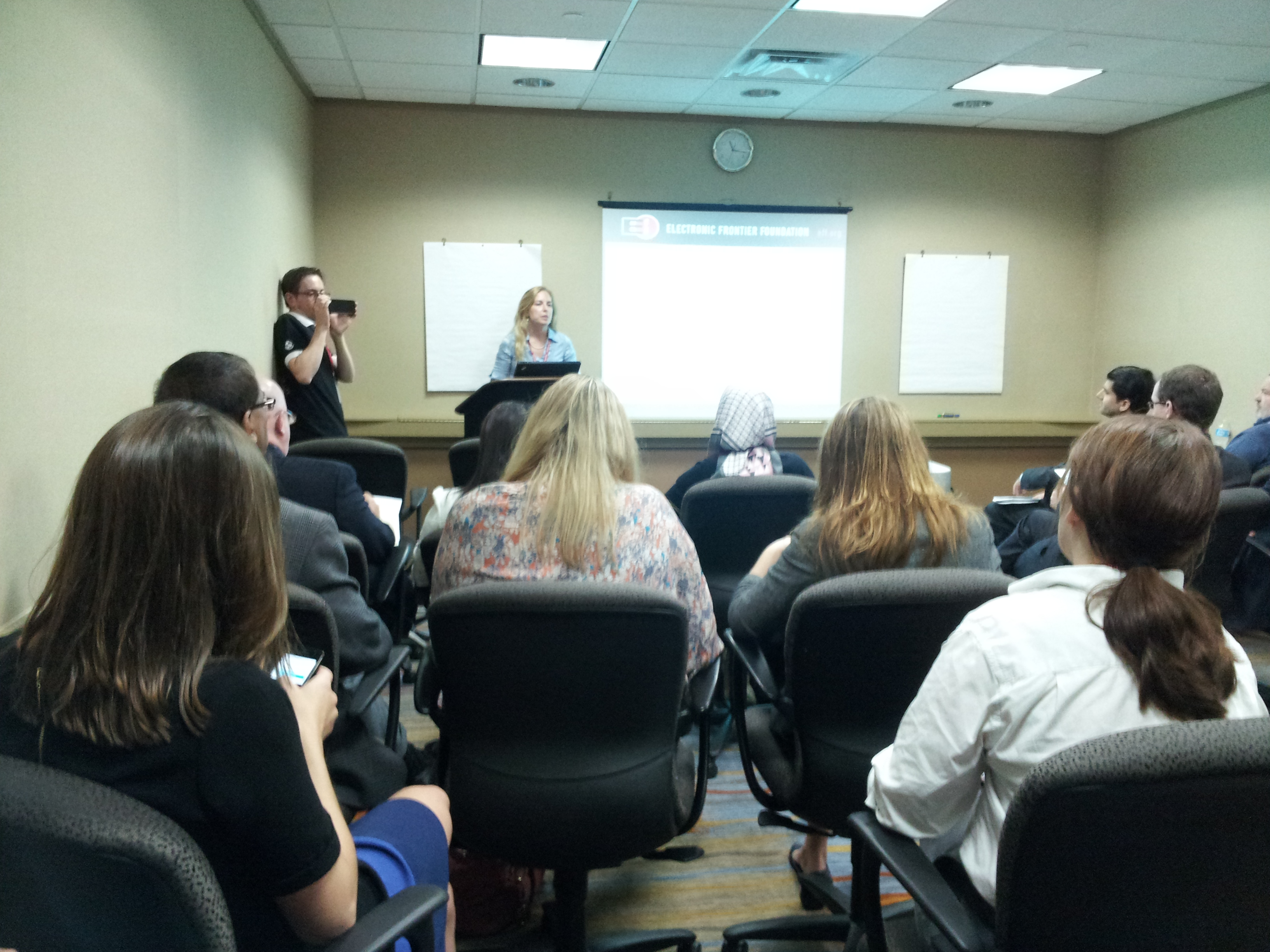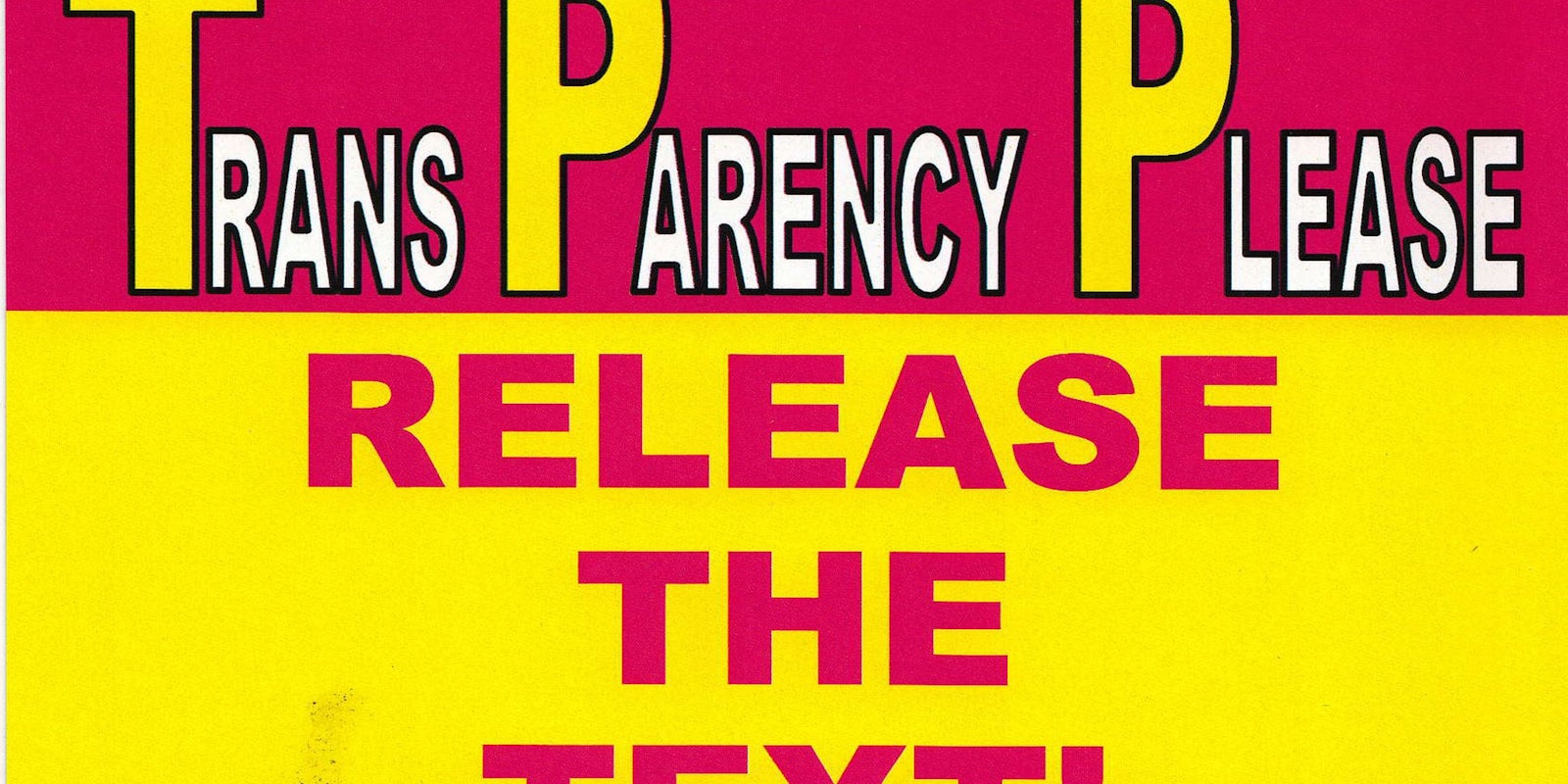Nestled among the rolling Appalachian hills in northern Virginia, about 45 minutes northwest of the White House, is a luxury resort called the Landsdowne. It features five restaurants, a 45-hole golf course, and a 12,000-square foot luxury spa. The reason for my visit on Sunday, however, was Landsdowne’s award-winning conference center, where government trade representatives from South America, Asia, and the U.S. met to negotiate the super-secret Trans-Pacific Partnership (TPP) from September 6-15.
The TPP is a massive trade agreement between nine countries (think the North American Free Trade Agreement or the World Trade Organization). Once finalized and signed by each party, it aims to create standards for how a host of industries—such as medicine, livestock, and textiles—do business. According to the Wall Street Journal, the TPP would “eventually encompass about one-third of the world economy.”
An early draft of the TPP’s intellectual property section also threatened to cut off Internet access to users who are repeatedly caught pirating copyrighted materials—a troubling scenario given the history of mistaken identity in copyright infringement cases and the noted difficulty of tracking pirates by their Internet protocol (IP) addresses.
There’s a bit of Orwellian doublespeak at the crux of the TPP. Officially speaking, no civilian has read the document the negotiators are at the Landsdowne to talk about. As part of the negotiation process—as has been the case with multinational trade agreements that came before it—each country agrees to keep the text secret.
However, several portions of TPP drafts have been leaked to the public. One of those, from February 2011, included the entire chapter on intellectual property. Most parties involved, from activists to corporate lobbyists and reporters, have presumably read it, but the U.S. won’t even release its specific negotiating platform for fear it will lose a bargaining chip.
The absurdity of the situation comes to light each time each time the TPP countries meet, when they dedicate a day to outside interests. Groups who want a say in the TPP (“stakeholders,” in the parlance of these meetings) get to hold small presentations and to set up tables in a huge conference room. It’s like a science fair for corporate interests. A different location is chosen for each meeting. Last time it was in San Diego, Calif.; New Zealand is next. On Sunday, in Leesburg, Va. (population 42,000), I got to watch the political theater unfold.
Over two-and-a-half hours, 60 stakeholders held short presentations with titles like “The Benefits of an Open, Private Insurance Market” and “FTA Impacts on Animal Welfare” in four sterile conference rooms.
Carolina Rossini, the director for International Intellectual Property for digital advocacy organization the Electronic Frontier Foundation, gave an 11-minute talk about how the TPP’s intellectual property standards could hurt everyday citizens.

Though about 275 of the TPP’s more than 400 negotiators attended on Sunday, Rossini presented in a small room with only 20 chairs. Those all filled up, and about 10 more people stood, huddled in in the back of the room. She warned in her Brazilian accent that TPP could punish people who pirate copyrighted material by disconnecting them from the Internet entirely, and that the agreement would force Chile, a TPP-negotiating country, to abandon what she described as a “forward-thinking” copyright law.
Attendees from a nearby presentation exited their conference room and loudly spoke outside the open door to Rossini’s room, drowning out her message.
—
Rossini was immediately followed by a man who is virtually her ideological opposite: Michael Schlesinger, a representative of the International Intellectual Property Alliance (IIPA), a corporate interest group representing 3,200 companies with a vested interest in protecting copyright holders. Among the IIPA’s clients are the Motion Picture Association of America (MPAA) and the Recording Industry Association of America (RIAA), both of which have lobbied for controversial copyright enforcement legislation, including the Stop Online Piracy Act (SOPA).
Schlesinger spoke to the same crowd as Rossini, giving a presentation called “TPP & IPR [intellectual property rights]: Myths and Realities—A Fact Check.” His second slide, “Myths about a TPP IP Chapter,” read:
“Some commentators have chosen to promote ‘myths’ about the possible effects of a TPP IP Chapter. At best, the myths divert attention away from the important policy aims being addressed by the TPP negotiation. At worst, they are misleading or inaccurate. This presentation aims to correct a few of these ‘myths’ and to present information about the commercial realities of copyright protection and enforcement.”
He then spoke about how online piracy represents a major chunk of Web use—citing one study that found non-pornographic piracy alone was responsible for 23.76 percent of all Internet traffic worldwide—and quoted figures showing that industries that depend on copyright are major forces in many of the negotiating countries, not simply the United States and Australia, as some have claimed.
One of Schlesinger’s “myths” was the claim that the TPP will result in “kicking people off the Internet.” In a series of bullet points, he argued that the agreement includes “No mandates to kick legitimate users off the Internet” and “No mandates for deep-packet inspections or ‘three strikes.’”
“Three strikes” refers to a “graduated response” system, where those suspected of copyright infringement get successive warnings from their Internet service provider, or “strikes.” Too many strikes will result in criminal penalties or being disconnected from the Internet entirely. France employs such a system, and the major Internet service providers in the U.S. are considering one.
Despite Schlesinger’s assurances that Internet users won’t be disconnected under the TPP, there may be reason to worry. According to article 16, section 3(B)(viii) of the TPP’s leaked, year-and-a-half-old chapter on intellectual property:
“[E]ffective action against any act of copyright infringement” includes “court-ordered relief to compel or restrain certain actions, [including] removing or disabling access to the infringing material, terminating specified accounts, and other remedies.”
This sort of procedure is particularly troubling because cases of mistaken identity in copyright infringement cases are becoming increasingly common. Zealous copyright holders often send several infringement notices at once, for instance, implicating innocent people. And from a technical standpoint, it’s difficult to identify who is actually responsible for piracy. Pirates are often tracked by their Internet protocol (IP) addresses, which are notoriously easy to fake. In some cases, judges have ruled that it’s impossible to equate a person with an IP address.
I later visited Schlesinger at his table in the large conference room, where he sat smiling behind a laptop and an iPad slideshow. Appearing in his early 30s and sporting a business suit, power tie, and slicked-back dark hair, he resembled affable ESPN reporter Darren Rovell.
Schlesinger offered stacks of folders filled with material from his earlier presentation, along with brochures promoting copyright protection. He spoke a bit about how protecting intellectual property is vital to a number of countries’ economies and stressed how much money is lost each year to Internet piracy.
I asked him whether he stood by his presentation’s claim that “TPP will result in ‘kicking people off the Internet’” was a myth.
“It is,” he said.
I showed him a printed-out copy of the section of the TPP leak that referred to “terminating specified accounts” of copyright infringers.
He visibly stiffened. “I’m not commenting on a leaked draft,” he told me. “From what I know, the TPP framework would not force anyone off the Internet. I don’t know anything about the TPP draft.”
Had Schlesinger actually read the TPP, either the leaked chapter or the current draft? I can’t say for sure. Legally, he can’t have read the latter, because he’s a federally registered lobbyist, which would bar him from seeing the text.
According to Carol Guthrie of the United States Trade Representative’s office (USTR), which represents the U.S. in international negotiations, only USTR representatives, a few members of Congress, and members of Congressionally appointed advisory committees are allowed access to the text.
Guthrie told me via email that “the Obama Administration barred lobbyists from being appointed or reappointed to our advisory committees three years ago.”
But just because registered lobbyists can’t serve on those committees doesn’t mean that copyright interests have no influence.
As Guthrie explained, “[A]dvisory committees were … set up by Congress as industry-based—with the idea of getting information from the companies that make and trade the products that we’re negotiating about.” In other words, the copyright industry is one of many with a rare seat at the table.
Among the members of the Industry Trade Advisory Committee on Intellectual Property Rights, which has full access to and gives advice on agreements like the TPP, is RIAA Executive Vice President Neil I. Turkewitz.
The RIAA has historically advocated for stronger copyright enforcement measures in the U.S. The organization was one of the major proponents of SOPA, which included controversial intellectual property provisions that Internet rights advocates worry could be included in the TPP. It also favors a “three strikes”-style approach to infringement—similar to the systems used in France, New Zealand, and the U.K.—which could terminate users’ Internet access as punishment for infringement.
Internet rights groups who oppose these positions, however, don’t have their own committee representatives, so stakeholder meetings like the one in Landsdowne provide some of their only opportunities to communicate directly with negotiators.
As Maira Sutton, the EFF’s Intellectual Property Coordinator, manned a table in the conference center, she was approached by a member of the USTR who appeared to be in his early to mid thirties. “He was very social, unlike other trade negotiators,” Sutton later told me. “He said that he’d only started two weeks ago.
The listened to her concerns about TPP transparency. “We said, seriously, it’s ridiculous that corporate representatives have access to the text when no one else does.” He responded that she had a legitimate worry, admitting it could seem odd that “corporate interests” are among the few groups allowed to view the TPP draft. She asked for his name and position with the USTR.
“He wouldn’t give us his card,” she told me.“It was weird.”
The negotiator vaguely told her that he works in “‘every area’ of negotiations,” and walked away.
—
Considering that the text of the TPP is a tightly held secret, the USTR negotiator who spoke with me on the phone Monday was remarkably frank about the U.S. negotiating strategy.
“Our position is entirely shaped by existing U.S. law,” he said. In particular, he said, the USTR follows the Digital Millenium Copyright Act (DMCA), the U.S.’s landmark 1998 bill dealing with online copyright enforcement.
“As a negotiator, my instructions don’t permit me to agree to anything that’s not in U.S. law,” he added.
I asked him if that would ever force service providers to disconnect users for piracy, and again he referred to a particular section the DMCA. Surprisingly, that law does require disconnection, although it’s rarely enforced in practice.
Under Title II, in a section called “Eligibility for Limitations Generally,” the DMCA says that if an Internet service provider (ISP)—say, AT&T—wants to avoid liability for its users pirating material:
[I]t must adopt and reasonably implement a policy of terminating in appropriate circumstances the accounts of subscribers who are repeat infringers[.]
No one I spoke with, neither activists nor lobbyists, could think of an instance where that provision had resulted in an individual having their service cut off. In the U.S. court system, ISPs aren’t forced to disconnect users, but in order to protect themselves under the DMCA, they have to be prepared to do so.
If the TPP is implemented, each negotiating country would adopt the same language. If the U.S. gets its way and the TPP reflects the DMCA, U.S. policy likely won’t change. But eight other countries would adopt that language as their own law, and they might interpret a requirement to disconnect pirates more strictly than American courts do.
—
After all the scheduled presentations on Sunday, while I grabbed a burger at the cheapest of the Landsdowne’s five restaurants, conference attendees took down all the stakeholders’ science-fair tables. When I returned, both stakeholders and negotiators were filing into the largest conference room. Intrigued, I started in.
A woman noticed my press pass and grabbed my arm. “I’m sorry,” she said. It was a “stakeholder briefing event,” and journalists weren’t allowed. My allocated time with the TPP was over. Soon, those stakeholders would be locked out, too, and only negotiators would remain.
As I left the hotel, I saw a ragtag bunch of protesters. They camped outside, unseen by anyone in those conference rooms and monitored by Virginia police to make sure they didn’t even enter hotel grounds.

There are layers of access to the TPP; there are even members of Congress angry they can’t read it. But the time will come—probably not this year, maybe later than 2013—when the negotiators finish their work and we all can read the text. No country will be bound by the document until ratified by its government, and before that can happen, the final draft has to be made public. Congress will vote on the TPP before the U.S. can join, and if the final text infringes on a free Internet, that’ll be citizens’ one chance to really fight it. It’s worth remembering that Congress has listened to Americans’ concerns on that topic before.
But for now, we’re all in the same position as the protesters kept far away from the hotel—just outsiders trying to get a glimpse of what’s really going on inside.
Photos by Kevin Collier. TPP sticker via EFF


